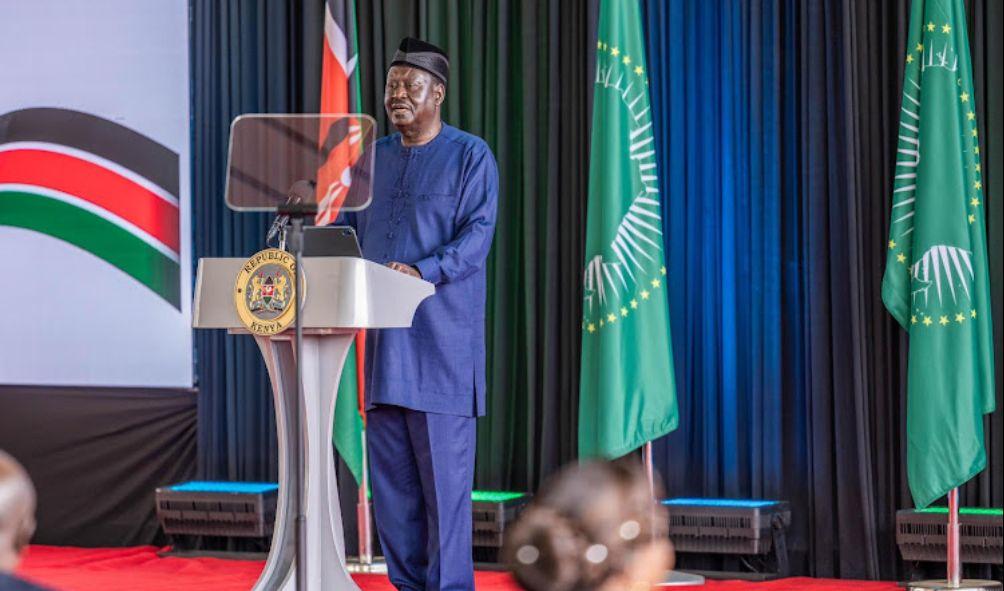Raila Odinga’s AU Visa Vision Faces Continental Hurdles: The Struggle for a Borderless Africa
Former Kenyan Prime Minister Raila Odinga’s ambition to prioritize the introduction of a continental visa, should he be elected chairperson of the African Union Commission (AUC), is likely to face significant challenges.
During the official launch of his campaign, Odinga vowed to implement an AU visa to eliminate barriers that have hindered free movement for decades.
The AU visa’s introduction could greatly enhance the free movement of people and goods across Africa, thereby boosting intra-continental trade.
Odinga shared a personal anecdote, highlighting the current travel challenges within Africa: “My friend Aliko Dangote says that to travel across the continent, he needs 35 visas. His French competitor, however, can travel visa-free across Africa with a French passport. What a disgrace! In Europe, a Schengen visa allows travel across 29 countries without any issue,” Odinga remarked, drawing a comparison to Europe’s Schengen zone.
However, on a continent where travel restrictions are the norm, Odinga’s vision faces considerable obstacles. Even in Kenya, despite President William Ruto’s 2023 promise to make the country visa-free by early 2024, foreign visitors must still obtain an Electronic Travel Authorization (eTA) at a cost.
Since January 2024, most travelers, except those from East Africa and a few select nations, must apply and pay $30 for a single-entry eTA before entering Kenya. While this policy reduces the need for a visa, it imposes a $30 fee on over 51 countries whose citizens previously enjoyed visa-free access.
In addition to the eTA issue, Odinga might be interested to learn that Kenyans face significant delays in obtaining travel documents.
ALSO READ:
- Inside Job Exposed: Kenyan Prison Wardens Convicted for Orchestrating Daring Terrorist Escape
- Uganda Pulls the Plug: Nationwide Internet Blackout Ordered Days Before Crucial General Election
- African Elections Under the Spotlight as Zambia Turns to Kenya Ahead of 2026 Vote
- “Two Drug Barons in Cabinet?” Kenya Government Fires Back as Ex-Deputy President Sparks Explosive Drug Claims
- Kenyan Court Freezes Use of Private Lawyers by Government, Sparks Nationwide Legal Storm
Many citizens experience long waits for passport approvals, hindering their ability to travel, trade, and access educational and employment opportunities across Africa. This is not just a Kenyan issue but a widespread problem across the continent, reflecting capacity challenges.
Odinga may need to focus on regional efforts. Regional Economic Communities have made notable progress in facilitating free movement across Africa, with the Economic Community of West African States (ECOWAS) and the East African Community (EAC) leading the way.
Within the EAC’s eight member states, there is free movement of goods and people, a model that could be extended to other regions following agreements with the Southern Africa Development Community (SADC) and the Common Market for East and Southern Africa (COMESA).
On a continental scale, resistance to change has been a major hurdle in implementing the AU’s free movement policies. For instance, the African Union passport, launched in 2018 to ease travel restrictions, has seen limited adoption.
Despite the removal of bilateral visas by some countries, additional fees like airport development charges or clearance service fees are often imposed.
The AU has also struggled to secure member countries’ support for its free movement protocols, including open skies initiatives that would ease air travel across Africa.
In 2018, African leaders adopted a treaty establishing the African Economic Community, focusing on the Free Movement of Persons, Right of Residence, and Right of Establishment. This protocol was intended to facilitate continental integration, particularly the effective implementation of the Africa Continental Free Trade Area (AfCFTA).
ALSO READ: I’m Not Aware of Any Kenyans Abducted During Protests – President Ruto
One of the goals was to achieve free movement of people within Regional Economic Community (REC) member states by 2023 and to eliminate visa requirements for intra-African travel by 2028.
However, by August 2024, only 33 AU member states had signed the protocol, and only four—Rwanda, Niger, Sao Tome and Principe, and Mali—had ratified it. The protocol requires at least 15 ratifications to come into effect.
A 2018 study by the United Nations Economic Commission for Africa (ECA) and the African Union Commission (AUC) highlighted that territorial borders continue to impede the free movement of people in certain African countries.
The study aimed to demonstrate the benefits of free movement for implementing the AfCFTA.
“There are reasons for this, including security concerns, socioeconomic disparities, and health epidemics. These challenges are often cited to justify reluctance by some countries to open their borders to free movement,” the report notes.
The Study on the Benefits and Challenges of the Free Movement of Persons in Africa reveals varying levels of development across regions, with differing national capacities to achieve freedom of movement.
“The necessary policies, procedures, and infrastructure to enable free movement are still lacking in many countries,” the report concludes.
In May 2024, the Free Movement Campaign, advocating for a ‘Borderless Africa,’ convened in Lusaka, Zambia, to push for the abolition of visa requirements for intra-African travel.
The ‘Borderless Africa’ campaign aims to create a continent where Africans can move freely, fostering better trade, integration, and development.
Raila Odinga’s AU Visa Vision Faces Continental Hurdles: The Struggle for a Borderless Africa
